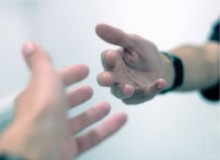 Peer support is of immense value in helping people find recovery from addiction and mental health problems. However, what is it about peer support that is so important? How does it work? Here, DJ Mac looks at a recent science paper focusing on this issue.
Peer support is of immense value in helping people find recovery from addiction and mental health problems. However, what is it about peer support that is so important? How does it work? Here, DJ Mac looks at a recent science paper focusing on this issue.
‘“Giving implies to make the other person a giver also.” So said Eric Fromm whose quote starts this research paper which travels to the heart of mutual aid. The clear message? In helping other, we help ourselves. The recovery saying “We only keep what we have by giving it away” hits the mark in this respect.
The researchers in this Finnish study looked at communication and support in Al-Anon groups, a 12-step mutual aid network for family and friends of alcoholics. In Finland, 97% of Al-Anon members are female and three quarters are partners of alcoholics. They conducted the research through questionnaires (169) and 20 interviews. In the survey they focused on two questions:



